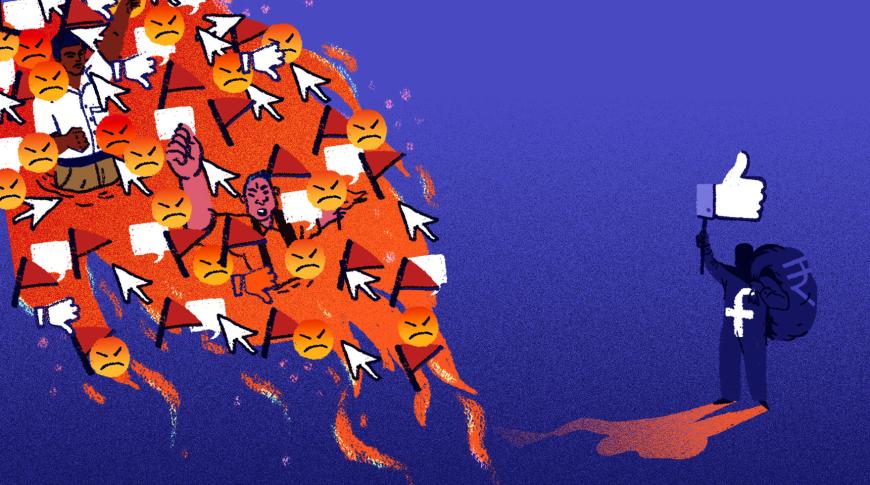
The Association for Progressive Communications (APC) is deeply concerned about the escalating instances of hate speech in India and is alarmed at reports of Facebook India’s failure to apply its community standards to the perpetrators of hate speech on its platform. In response to this trend, we sent a letter to Facebook executives requesting that they take concrete steps to address this situation.
In our letter, we call on Facebook to:
-
Conduct an audit on hate speech on their platform and take immediate action against such content.
-
Conduct a thorough investigation into allegations of non-application of community standards relating to hate speech by Facebook India.
-
Place erring officials responsible for the failure of curbing hate speech on the platform on leave while the investigation is being carried out.
-
Commit to putting in place measures to remedy any political bias in the policy or operation spaces of Facebook towards maintaining neutrality.
-
Immediately engage in an open dialogue with civil society and marginalised communities to identify and implement solutions.
Situation in India
Over the past few years, there has been a steady rise in hate and communal violence against persons belonging to minority religions in India. Earlier this year, India experienced historic protests against the draconian and discriminatory Citizenship Amendment Act and the National Register of Citizens. In response, India has witnessed large-scale violence against dissenters, police excesses, and a clampdown on freedoms of religion and expression as well as assembly and association. Communal violence against religious and caste minorities, which has come at a severe human and monetary cost, has been propelled by state complicity and rampant hate speech in media and online spaces.
The situation has worsened with a steep rise in Islamophobic and other hate speech content against the backdrop of the COVID-19 pandemic, where members of India’s ruling party took to social media to propagate misinformation and stigma against minorities.
Hate and the role of platforms
Hate speech not only hurts, but also lays the ground for hostility and violence. Even speech that is not a direct incitement to violence or discrimination may contribute to fostering greater acceptance of such violence and condones if not encourages such acts. Systematic dehumanisation carried out through smear campaigns, slurs, misinformation, sensational and fabricated “news” on social media enable the construction of an “other” as a threat to the social fabric or national security. This has the effect of routinising discrimination and even physical violence, ultimately paving the way for communal disharmony and genocide. Social media platforms such as Facebook, which are a dominant source of information and communication, are key players in ensuring such violence is not perpetuated.
With over 290 million users, the highest across the globe, Facebook India has five offices in the country employing thousands of Indian nationals. Concerns relating to hate speech in India on the company’s platforms have been repeatedly raised by civil society and international experts. Similar concerns have also been raised in other countries in the region such as Sri Lanka and Myanmar. In Myanmar, Facebook has been used to propagate hate and violence against Rohingya Muslims, which has repeatedly resulted in riots and violent killings.
The Wall Street Journal revelation
In light of the gravity of the situation, reports from the Wall Street Journal (WSJ) of Facebook India’s top policy executive, Ms. Ankhi Das, opposing and preventing the application of hate speech rules to members of the ruling party in India is deeply disturbing. One reported case, for example, relates to a post by T. Raja Singh, a Bharatiya Janata Party state legislator, stating that Rohingya Muslim immigrants must be shot, calling Muslims traitors and threatening to raze mosques. It was reported that there have been other such instances where community standards were not applied to members of the party on concerns relating to this affecting the monetary prospects of the company. Subsequent reports have highlighted bias against certain political parties and other reports also indicate that Facebook India employees have raised questions about community standards not being applied even-handedly by the Facebook India office and the lack of diversity in the public policy team.
The urgency of addressing hate speech online
Platforms like Facebook face huge challenges in dealing with the volume of hate speech currently circulating online. It is crucial that these platforms root their community standards, policies and operations in international human rights law and standards, especially when dealing with hate speech, which has far-reaching consequences. Executives responsible for policy making and compliance must resolve to ensure accountability and prevent monetary considerations trumping the rights and safety of users. Hate speech from and against persons belonging to all or any religions or faiths must be treated with equal seriousness.
Image by Kruttika Susurla.